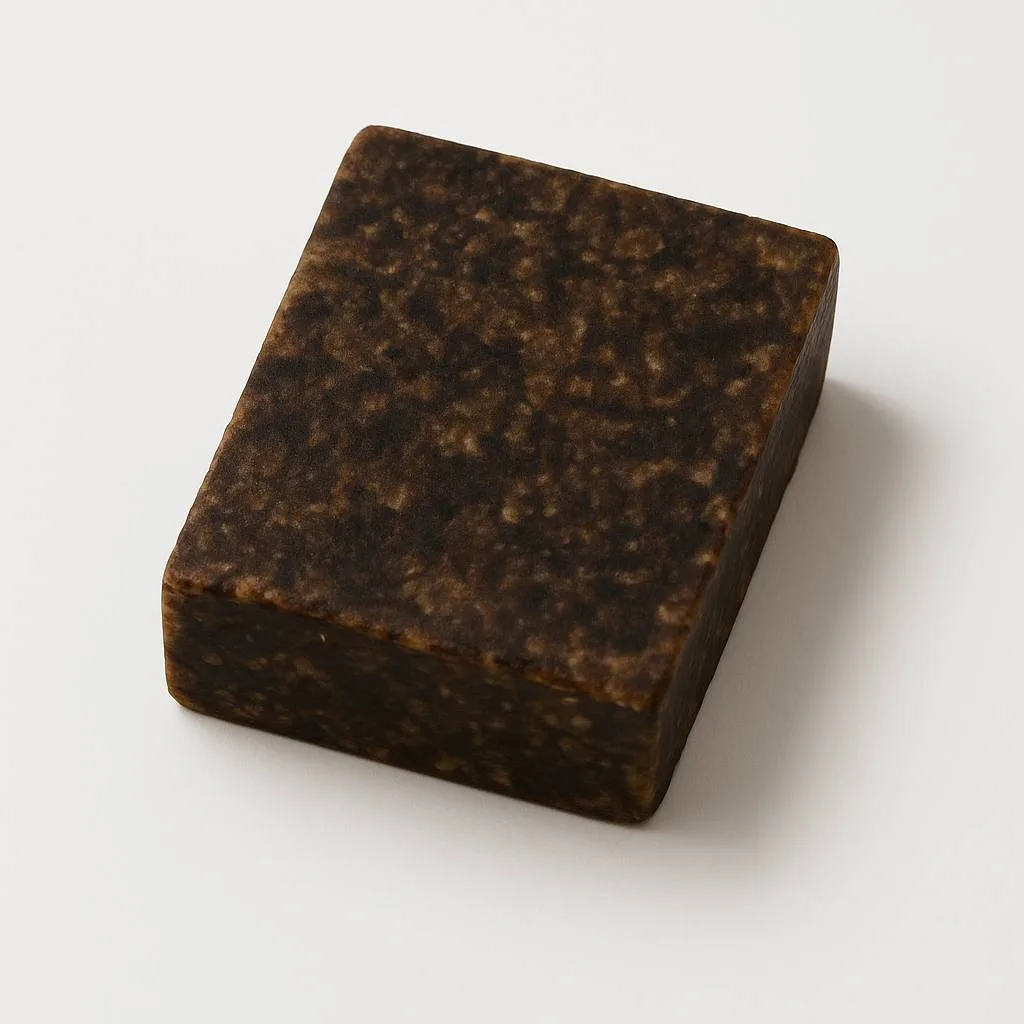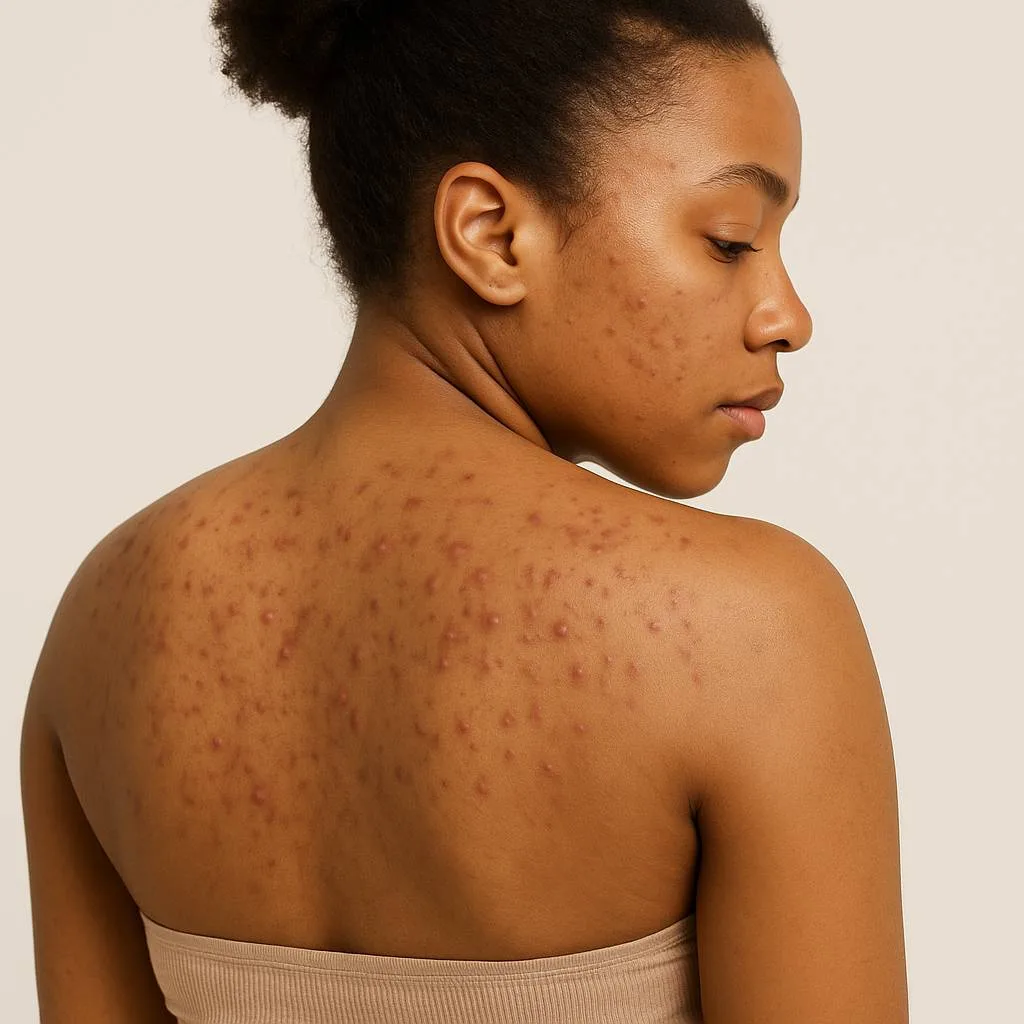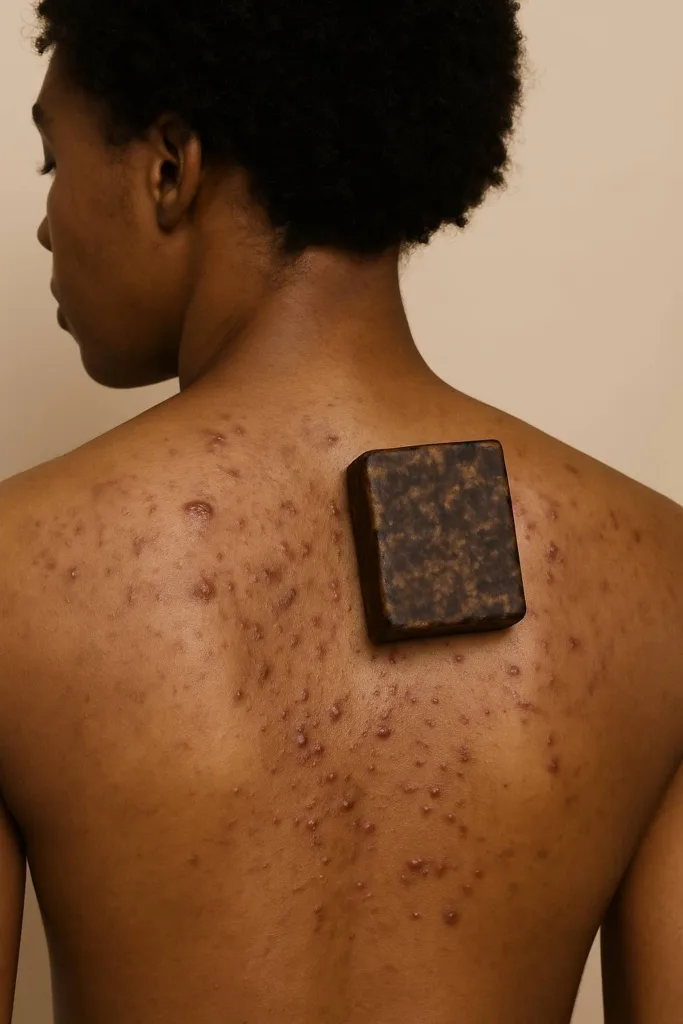Bacne—short for back acne—is a common skin woe that can feel even more frustrating than facial acne. Unlike pimples on your face, which are easy to spot-treat and hide, back acne is hard to reach, tricky to manage, and often resistant to over-the-counter products. Traditional treatments, like salicylic acid body washes or benzoyl peroxide creams, can leave skin dry, irritated, or stripped of moisture, creating a cycle of more breakouts.
That’s where natural solutions come in. For years, people have turned to African Black Soap as a gentle yet effective remedy for various skin issues, and African Black Soap Bacne treatment is gaining traction for good reason. This time-honored soap, made from plant-based ingredients, targets the root causes of back acne without the harsh side effects of chemical treatments. If you’re tired of struggling with bacne, it might be time to give this natural powerhouse a try. You can Explore how African Black Soap targets bacne at the source to learn more about its potential.
What Is African Black Soap and Why Is It Effective?
African Black Soap is far from your average cleanser. Originating in West Africa—specifically Ghana, Nigeria, and Senegal—this traditional soap has been used for centuries to address a range of skin concerns, from acne to dryness. What sets it apart is its simple, natural formula and handcrafted production process, which has been passed down through generations of skilled artisans.
At its core, African Black Soap is made from a blend of roasted plantain skins, cocoa pods, shea butter, palm kernel oil, and water. The “black” in its name comes from the roasting process, which darkens the plantain and cocoa ingredients and infuses the soap with a rich, earthy scent that’s both grounding and invigorating. Unlike commercial soaps loaded with sulfates, parabens, and synthetic fragrances, African Black Soap contains no artificial additives, making it suitable for even sensitive skin.

The effectiveness of African Black Soap lies in its unique combination of ingredients:
- Plantain skins: Rich in vitamins A and C, they provide gentle exfoliation to unclog pores and promote skin renewal, which is key for preventing bacne.
- Cocoa pods: Packed with antioxidants, they fight free radicals and reduce inflammation, a key driver of acne that can make bacne look and feel worse.
- Shea butter: A deeply moisturizing ingredient that balances the soap’s cleansing properties, preventing over-drying—a common issue with many bacne treatments that can lead to more breakouts.
- Palm kernel oil: Contains lauric acid, a natural antibacterial compound that targets Propionibacterium acnes—the bacteria responsible for acne, including the stubborn pimples on your back.
Together, these components make African Black Soap a multi-tasking powerhouse—cleansing deeply, killing bacteria, reducing inflammation, and hydrating skin—all of which are essential for treating bacne. It’s no wonder that African Black Soap Bacne treatment has become a go-to for those seeking a natural solution.
How African Black Soap Targets Bacne at the Root
Bacne forms for many of the same reasons as facial acne: clogged pores, excess oil, bacteria, and inflammation. But the back has thicker skin, larger pores, and more sebaceous glands, making it prone to bigger, more painful breakouts that can linger for weeks. African Black Soap Bacne treatment works by addressing each of these issues at the source, providing a comprehensive solution that goes beyond surface-level cleaning.
First, African Black Soap’s gentle exfoliating properties—thanks to enzymes in plantain skins—loosen and remove dead skin cells that can clog pores. This prevents the formation of whiteheads and blackheads, which often lead to more severe breakouts when left untreated. Unlike harsh scrubs that can irritate the skin and worsen inflammation, African Black Soap exfoliates without abrasion, making it safe for regular use on the back, even for those with sensitive skin.
Second, the lauric acid in palm kernel oil (a key ingredient in African Black Soap) has natural antibacterial properties that target Propionibacterium acnes—the bacteria responsible for acne. By reducing bacterial overgrowth, African Black Soap helps prevent new pimples from forming and speeds up the healing of existing ones, which is crucial for breaking the cycle of bacne.
Third, African Black Soap balances oil production. The back is prone to excess sebum, which mixes with dead skin cells and bacteria to clog pores. Shea butter in the soap moisturizes without greasiness, signaling to the skin that it doesn’t need to produce extra oil. This helps keep pores clear and reduces the likelihood of future breakouts, making African Black Soap Bacne treatment a long-term solution rather than a quick fix.
Finally, the anti-inflammatory compounds in cocoa pods and plantain skins soothe redness and swelling, making African Black Soap effective at calming painful, inflamed bacne that can make wearing certain clothes uncomfortable. This multi-pronged approach is why African Black Soap Bacne treatment is so effective for many people. If you’re ready to tackle your back acne, Shop African Black Soap for clearer, smoother back skin to get started.
Week-by-Week Bacne Improvement: What to Expect
If you’re considering African Black Soap Bacne treatment, you’re probably wondering how long it will take to see results. Like any skincare product, consistency is key, and results can vary based on the severity of your bacne—from mild occasional pimples to severe, cystic breakouts. Here’s a detailed breakdown of what to expect over four weeks of regular use:
Week 1: Adjustment Period
In the first week, you’ll notice that African Black Soap lathers richly and leaves your back feeling clean without the tight, stripped sensation that comes from many chemical-based bacne washes. Some people experience mild tingling or dryness as their skin adjusts to the natural ingredients—this is normal and a sign that the soap is working to balance your skin. By the end of the week, you may notice that your back feels less oily throughout the day, and existing pimples may appear slightly less red and inflamed. This early stage is crucial for setting the foundation for African Black Soap Bacne treatment success.
Week 2: Early Improvements
By week two, the antibacterial properties of African Black Soap start to shine. You’ll likely see fewer new pimples forming, and existing breakouts may be smaller and less painful. The exfoliating effects also become more noticeable: your back may feel smoother to the touch, and blackheads that have been stubborn for weeks may start to loosen and disappear. Many users report that their back feels “lighter” and less irritated during this phase, making African Black Soap Bacne treatment a more comfortable experience than their previous routines.
Week 3: Visible Clearing
In week three, the results become more dramatic. Most people report a significant reduction in active bacne, with fewer whiteheads and pustules. The skin on your back may look brighter and more even, as the soap’s antioxidants work to fade post-inflammatory hyperpigmentation (dark spots from old pimples) that can make bacne look worse than it is. If you’ve been dealing with textured skin from past breakouts, you’ll notice a marked improvement in smoothness, which can boost confidence when wearing back-baring clothing. This is when many users start to truly believe in the power of African Black Soap Bacne treatment.
Week 4: Long-Term Results
By the end of the fourth week, you’ll see a noticeable difference in the overall condition of your back. Active breakouts are likely minimal or gone, and your skin will feel balanced—neither too oily nor too dry. Many users find that their bacne is significantly reduced, and some even experience complete clearing, especially if they’ve been consistent with their routine. What’s more, the preventive properties of African Black Soap mean that new breakouts are less frequent, helping you maintain clear skin over time. It’s clear why African Black Soap Bacne treatment has earned a loyal following.
A Medical News Today article on natural acne treatments notes that plant-based cleansers like African Black Soap can take 4–6 weeks to show full results, as they work to improve skin health from the inside out rather than just masking symptoms. This aligns with the timeline above, emphasizing the importance of patience and consistency when using African Black Soap Bacne treatment.

African Black Soap vs Traditional Bacne Treatments (e.g., Salicylic Acid)
When it comes to bacne treatments, traditional options like salicylic acid and benzoyl peroxide are popular for a reason—they’re effective at unclogging pores and killing bacteria in the short term. But they also come with drawbacks that make African Black Soap Bacne treatment a compelling alternative for those seeking long-term, gentle care.
Salicylic acid is a beta-hydroxy acid (BHA) that exfoliates inside pores, making it effective at treating blackheads and whiteheads. However, it can be drying, especially with daily use, and may cause irritation or peeling on the back’s thicker skin, which can lead to more breakouts as the skin overcompensates by producing excess oil. Benzoyl peroxide, on the other hand, kills acne-causing bacteria but can bleach clothing and towels, leaving unsightly stains, and may cause redness or stinging—particularly problematic for those with sensitive skin.
African Black Soap, by contrast, offers similar benefits without the harsh side effects. Its natural exfoliants work like salicylic acid to unclog pores but are gentler, making them suitable for daily use without the risk of over-drying. The lauric acid in African Black Soap has antibacterial properties comparable to benzoyl peroxide, according to a study cited by WebMD, but without the bleaching or irritation, making African Black Soap Bacne treatment a more convenient and comfortable option.
Another advantage of African Black Soap is its moisturizing effect. Traditional bacne treatments often strip the skin of its natural oils, triggering the sebaceous glands to produce more oil and worsening breakouts—a frustrating cycle that’s hard to break. African Black Soap’s shea butter keeps skin hydrated, breaking this cycle and promoting long-term balance that helps prevent future bacne.
Dermatologists at Cleveland Clinic note that natural alternatives like African Black Soap are a good choice for people with sensitive skin or those who experience irritation from chemical treatments. For bacne, which is often persistent and requires long-term management, the gentle nature of African Black Soap makes it a sustainable option that you can use daily without worrying about damage to your skin barrier. If you’re curious about why it’s gaining popularity, Why African Black Soap may be your solution to persistent bacne explains more.
Tips for Using African Black Soap on Back Acne Safely
To get the most out of African Black Soap Bacne treatment, it’s important to use it correctly. Here are some detailed tips to ensure safe, effective results that maximize the soap’s benefits while minimizing any potential irritation:
- Use lukewarm water: Hot water can strip the skin of its natural oils and irritate existing bacne, making breakouts worse. Opt for lukewarm water to lather the soap and rinse thoroughly—this helps preserve the skin’s moisture barrier while allowing the soap’s ingredients to work effectively.
- Invest in a back scrubber: Since the back is hard to reach, a long-handled brush or loofah can help distribute the soap evenly and exfoliate gently. Look for one with soft, natural bristles to avoid irritation—synthetic bristles can be too harsh and cause micro-tears in the skin, which can lead to more breakouts.
- Lather well: Rub the soap between your hands or onto the scrubber to create a rich lather before applying it to your back. This ensures the ingredients are evenly distributed and allows the soap to penetrate pores more effectively, which is key for African Black Soap Bacne treatment success.
- Limit to 1–2 times daily: Overuse can lead to dryness, even with the moisturizing properties of shea butter. Stick to once in the morning and once at night, or adjust based on your skin’s needs—if you notice dryness, cut back to once a day and pair with a moisturizer.
- Moisturize afterward: While African Black Soap is less drying than traditional treatments, applying a lightweight, non-comedogenic moisturizer after showering helps lock in hydration and support the skin barrier. Look for moisturizers with ingredients like hyaluronic acid or glycerin, which are gentle and won’t clog pores.
- Patch-test first: If you have sensitive skin, apply a small amount of the soap to your inner elbow and wait 24 hours to check for irritation. This is especially important if you’ve had reactions to natural ingredients in the past, though African Black Soap is generally well-tolerated.
- Be patient during the adjustment period: Some people experience mild dryness or purging (temporary breakouts as pores clear) in the first week. This is normal and a sign that the soap is working to clear out impurities—stick with it, and these issues should subside as your skin adjusts to African Black Soap Bacne treatment.
By following these tips, you can maximize the benefits of African Black Soap while minimizing the risk of irritation, ensuring your bacne treatment is both effective and comfortable.
Real Testimonials: Does African Black Soap Work for Bacne?
Don’t just take our word for it—countless users have shared their success with African Black Soap Bacne treatment. Here are some real testimonials from people who’ve tried it, highlighting different experiences and skin types:
- “I’ve struggled with bacne for years, trying every body wash under the sun—salicylic acid, benzoyl peroxide, you name it. Nothing worked for long, and my back always felt dry and irritated. After using African Black Soap for a month, my back is clearer than it’s been in ages. No more painful pimples, and my skin feels so smooth and balanced. I can finally wear tank tops without feeling self-conscious!” — Jessica, 28
- “Is black soap good for pimples? Absolutely. I was skeptical about natural remedies, but after two weeks of using African Black Soap on my back, the breakouts that had plagued me since high school started to disappear. What I love most is that it doesn’t irritate my skin like other treatments did. Now, three months later, my back is practically clear, and I’ve even started using it on my face with great results, proving that african black soap pimples treatment works beyond just the back.” — Mike, 31
- “I have sensitive skin, so most bacne treatments leave me red and itchy. African Black Soap is gentle but effective—my back is clear, and I haven’t had any redness or dryness. It’s become a staple in my shower routine, and I recommend it to everyone who complains about bacne. African Black Soap Bacne treatment is truly a game-changer.” — Priya, 25
- “My bacne was severe, with lots of cystic pimples that hurt to touch. I tried African Black Soap on a whim after reading about African Black Soap Bacne treatment online, and I’m so glad I did. After four weeks, the cystic pimples are almost gone, and the scars are fading too. I’ll never go back to chemical washes—this stuff is a miracle worker for my skin.” — David, 35
- “I’ve tried everything for my bacne, and nothing stuck until I found African Black Soap. It’s gentle, smells great, and actually works. After six weeks, my back is completely clear. I can’t say enough good things about African Black Soap Bacne treatment! Even my dermatologist was impressed by the results during my last visit.” — Taylor, 27
These testimonials align with the positive reviews found on Amazon and skincare forums, where African Black Soap consistently earns high ratings for its ability to clear bacne without irritation. Many users note that it’s the first product that has worked for them long-term, highlighting its effectiveness and gentle nature. If you’re ready to join them, See results with African Black Soap for body acne treatment today.

Other Skin Benefits of African Black Soap Beyond Bacne
While African Black Soap Bacne treatment is a standout use, this versatile soap offers benefits for other skin concerns too, making it a valuable addition to any skincare routine:
- Fades acne scars: The gentle exfoliation and antioxidants in African Black Soap help reduce the appearance of post-acne marks by promoting skin cell turnover and brightening dark spots. This is especially helpful for those with bacne scars that linger long after the pimples are gone.
- Improves skin texture: Regular use smooths rough patches and evens out skin tone, leaving the back (and other areas like the arms and legs) feeling soft and supple. This can make a big difference in how your skin looks and feels, even without active breakouts.
- Soothes dry skin: Shea butter in the soap provides deep hydration, making it effective for treating dry, flaky skin on the back, elbows, and knees—common areas that can be neglected in skincare routines. Unlike heavy moisturizers that can clog pores, African Black Soap hydrates without greasiness.
- Reduces body acne elsewhere: African Black Soap works on chest acne, shoulder acne, and even butt acne, making it a multi-purpose solution for body breakouts. This means you can simplify your routine by using one product for multiple concerns, saving time and money.
- Calms eczema and psoriasis: The anti-inflammatory properties of plantain and cocoa help soothe irritated skin conditions, though it’s always best to consult a dermatologist first. Many users with mild eczema report that African Black Soap helps reduce redness and itching when used regularly.
These additional benefits make
